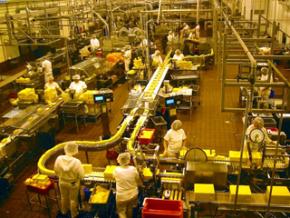Who produces the wealth in society?
The late British socialist introduces Karl Marx's labor theory of value.
THE BRITISH author and socialist George Bernard Shaw once wrote, "I don't need a theory of value to tell me the poor are exploited." He thought that Marxist economic theory was an unnecessary piece of armchair philosophizing.
This is a common point of view and often connected with the idea that Marxist economics is boring and hard to understand. Actually, the key ideas are easy enough to grasp--once you know what they're intended for. Every theory has a purpose.
Marx's purpose in analyzing capitalism was, first, to show how working people were exploited, and second, to uncover what he called the "economic law of motion" of the system. The first point becomes clear when you consider other system of exploitation that existed in the past.
Under the old feudal system in Europe, serfs worked part of the time on their own plots of land and part of the time on their lord's land. The serfs weren't paid for the extra work, so it was obvious that part of the fruits of their labor was going to the lord. They were exploited.
Modern workers, on the other hand, don't seem to have to put in extra work time each week without pay. So how are workers exploited under capitalism in the scientific sense of the term--of having to work for nothing for the benefit of an exploiting class?
Karl Marx's labor theory of value explains how.
FIRST OF all, capitalism is a system of commodity production. This means simply that goods are produced for sale. So, what decides the relative prices of, say, a television and a car?
Clearly, it has something to do with the fact that it costs more to make a car than it does to make a television. But why does it cost more?
Marx's answer is that "the value of a commodity is determined by the quantity of socially necessary labor time required for its production." To put it crudely, a car costs more because more work has to be put in to make it.
This idea didn't originate with Marx. As one modern economist put it:
The labor theory of value is one of the most powerful truisms in classical economics...and it apparently would have been still current--with refinements, to be sure --among orthodox economists if Marx and some of his forerunners had not put it to such effective use as the touchstone of working-class ideology.
Of course, the cost of the materials that go into making the car is greater than the cost of materials that go into the television. But these materials are also commodities, and their value is determined in the same way--by how much labor went into producing them.
The value of the end product is determined by the total amount of time needed, on average, for the whole process of producing it--and everything that went into it, including transportation costs and so on.
What does this have to do with exploitation?
Capitalists make money by selling commodities at prices that, at first glance, appear to be close to their values as determined by the amount of labor that went into them. Workers don't have material commodities to sell. They do have something to sell, though--their ability to work, or their labor power.
Wages are the price of labor power, and since labor power is also a commodity, bought and sold like any other, it has its value. "The value of labor power," Marx wrote, "is determined by the value of the necessaries required to produce, develop, maintain and perpetuate the laborer."
But the value of labor power isn't connected at all to the value of the goods produced by that labor power. The difference between the value of the commodities produced and the value of the labor power used in their production is what Marx called "surplus value."
And in systems where workers are highly productive, the difference is very large.
The surplus value belongs to the bosses. It is the source of their profits. In other words, after employers pay for raw materials, semi-finished goods, wages and other expenses, they receive an income--which is made up of the unpaid labor of workers.
This is why socialists say that capitalism is a system built on organized theft.
First published in the March 17, 2000, issue of Socialist Worker.



